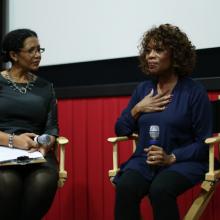racism is sin
After your recent relocation to a new city, you are invited to a local congregation by one of its members. After that first visit, you don’t find anything compelling you to come back to worship the following Sunday.
Now fast forward five years. For some unknown reason, you find yourself visiting that same congregation. But this time, it is obvious that something dramatic has happened; a new senior pastor has been called, and, in less than a year, the transformation of the church has been dramatic. The trend of slowly losing members has now stopped. To the delight of longtime members, almost every Sunday new people are accepting Christ or renewing their commitment to Christ. Vibrant children, youth, and family ministries are now in place. Ten percent of the budget is dedicated to local and global mission. People are growing deeper in their faith. The congregation of a little less than 400 begins to grow in such a way that during the following five years it reaches 1,600 members. This time around, you and your family decide to join this congregation. Your faith is reenergized and you feel like you are finally in the right place.
The story could end here and we could say, “This family happily and faithfully journeyed with this congregation for many years.”
There was only one problem in this successful congregation.
AFRICAN AMERICANS around the country are finding it is dangerous to call 911. Jack Lamar Roberson’s family in Waycross, Ga., discovered this the hard way when they placed an urgent call to 911 in October 2013 because his fiancée thought that he had taken an overdose of diabetes medicine.
Instead of sending EMTs, the dispatcher sent the police. Within 20 seconds of being in the house, police shot Roberson nine times, with bullets striking his back, arms, chest, and head as he held his arms up in the air. Although he was a veteran, he did not die from bullet wounds at the hands of strangers in a foreign land. Instead, white police gunned him down in his home.
Killings like this—which could be called anti-black hate crimes by police—are far too common. “Operation Ghetto Storm,” a 2012 report by the Malcolm X Grassroots Project, revealed that white police officers, security guards, or vigilantes kill an unarmed black man, woman, or child every 28 hours in the U.S. In 2012, police officers shot 57 people in Chicago—50 were black, two were white. Miami police officers killed seven black men within eight months in 2011. The Houston-based African-American News & Issues headlined an article this spring: “Open Season on Blacks in Texas: Cops Are Shooting First & Not Asking Questions.”
These police killings of black people emerge out of a culture and system of white supremacy. In such a context, police killing of black people is not a black problem. It is an American problem that shreds the curtains of democracy.
The ethos of slavery still runs deep in our national consciousness. Alfre Woodard, a supporting actress in the upcoming movie 12 Years a Slave, hopes that point is taken by all who see it.
“Whenever there is repression, it takes toll on everyone; especially a physical and psychic, stunting pain on the abuser,” Woodard said at a panel following a pre-screening of the movie hosted by Sojourners last week. “My hope, expectation is that audiences will start to think about slavery in a new way. That they’ll come away with some small perspective to understand each other better.”
The panel gathered to begin the conversation about residual impacts of slavery on the United States. Woodard started the discussion with a description of what it was like to be set and involved with a film that revolves around such a difficult emotional topic.
[view:Media=block_1]


